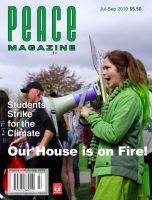
Peace Magazine Jul-Sep 2019, page 13. Some rights reserved.
Search for other articles by Fergus Watt here
Murray Thomson, one of Canada’s most committed and effective peace activists passed away this past May in Ottawa. He was 96.
Murray was much loved and admired by his many friends and colleagues in the NGO world. His contributions to civil society over a lifetime of work, principally in the peace and development fields, were many and varied.
I got to know Murray well during the years when a number of Ottawa peace organizations were housed in a building (the “Spruce Street peace ghetto”) just west of downtown Ottawa.
He was always generous with his time, advice and friendship. He had a wonderful, irrepressible sense of humor. He loved composing doggerel, then sharing his ragged, whimsical, but invariably funny verse with friends and colleagues.
There were six peace organizations on the second floor of the Spruce Street building. Murray had been involved in launching three of them, including Peacefund Canada, a fundraising foundation to support peace work that he ran for nearly 20 years before it merged with Peace Brigades International in 2006.
Being a catalyst for new ideas, new campaigns and new organizations was one of Murray’s hallmarks. There was a restless quality to his activism. Our work for peace was never enough. When he launched Peacefund, he said, “The militarists have plenty of money. We need to get more money into the peace movement.”
In 1976 Murray teamed up with Ernie and Nancy Regehr to form Project Ploughshares, which became Canada’s largest peace and disarmament group. In the 1980s he was a key figure in bringing a coalition of peace, environment and development organizations together for a national agenda-setting exercise, the “Election Priorities Project,” that galvanized activists and networks in communities and ridings across the country.
He kept at it even in retirement. When Murray was invested in the Order of Canada, he saw the honor as a campaigning opportunity. He organized over a thousand fellow OCs to lend their support for disarmament, through the “Canadians for a Nuclear Weapons Convention.”
Born in 1922 in Taokow, China to Presbyterian missionary parents, Murray was an eyewitness to civil war as a young teenager. After the family returned to Canada in 1937, Murray joined the Air Force during the Second World War but did not see active duty. Following the war he enrolled at the University of Toronto where he completed a Bachelors degree and played on the university football team. Later he joined the Department of Adult Education in the Tommy Douglas government in Saskatchewan.
After graduate studies at the University of Michigan he moved to Thailand and worked as a UNESCO fellow at the International Institute for Child Study. Later, while working for the American Friends Service Committee in Darjeeling, India, he met Thai activist and biophysicist Suteera Vichitranonda. They were married in 1964, at the Friends Meeting House in Toronto. Their daughter, Sheila Quarles van Ufford-Thomson now lives with her family in The Netherlands.
Murray and Suteera returned to Thailand in the 1960s. He worked for CUSO at a time when the Vietnam War was having devastating impacts across the region. He would go on to become CUSO’s Executive Director in the early 1970s before leaving to help launch Project Ploughshares.
Murray Thomson had the kind of uplifting personality that seemed to bring the best out of those he knew and worked with. He cared; he wanted to make a difference; and being with him, one could not help but feel the same way. He was open-minded, light-hearted, yet persistent and determined, actively working for peace – literally – until his dying days.
A great guy, who lived a great life. So many of us miss him now, but count ourselves lucky to have known him.
A remembrance event in Murray’s honour is being planned for this fall. More details can be found online at nuclearweaponsconvention.ca.
Fergus Watt is Executive Director of the World Federalist Movement – Canada.

Peace Magazine Jul-Sep 2019, page 13. Some rights reserved.
Search for other articles by Fergus Watt here